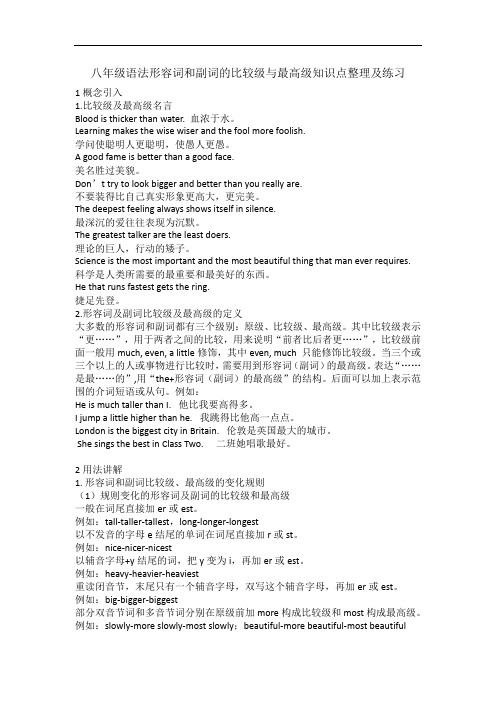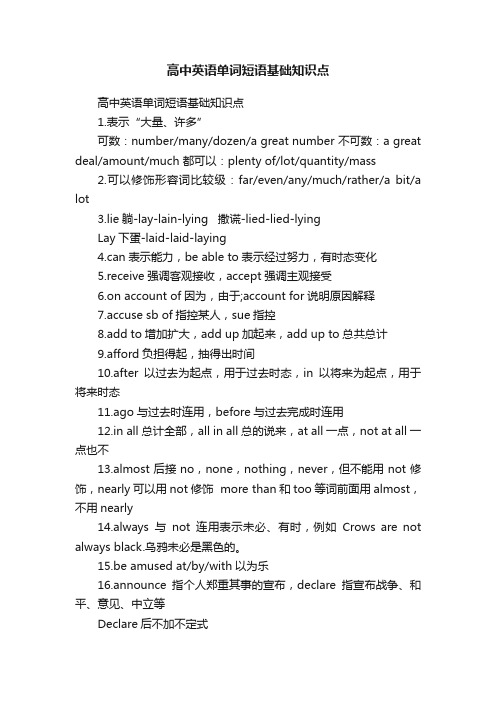可以修饰比较级的单词与短语
形容词及副词的比较级和最高级的用法

比较级和最高级一、形容词比较级和最高级的规则其它不规则的变化:二、形容词比较级基本用法1、与than搭配的基本形式(1)名词/代词He is older than me.(2) 动名词/从句Skiing is more exciting than skating.(3) 状语/动词/形容词/副词①much/a lot/ a bit/ a little/ slightly/any/ no/ even/ some/ stillEg: She is feeling a lot/much better today.Do you feel any better today?She is no older than mike.②数词My sister is ten years younger than me.2、特殊搭配1)“比较级+and+比较级”表示“越来越……”eg: He becomes fatter and fatter. She is growing more and more beautiful2)“The +比较级…,the +比较级”表示“越……,越……”The busier he is ,the happier he feels3)表示两者中”较……“时,用the + 形容词比较级+ of 短语来表达。
He is the taller of the two.4)在含有or的选择疑问句中,如果有两者供选择,前面的形容词要用比较级形式。
5)More ...than...的几种用法和含义①more B than A = less A than B. He is more lazy than slow at his work= he is less slow than lazy at his work.②no/not any more/less… than…两个都不(neither)③More than不仅仅是,no Less than(不)少于,more or less 差不多The work is more or less finished.one more=another more Any other+名词单数(名词可以省略)3、修饰比较级的词①a bit, a little, rather, much,far, by far, many, a lot, lots, a great deal, any, still, even(very只修饰原级)②用表示倍数的词或度量名词作修饰语。
八年级语法形容词和副词的比较级与最高级知识点整理及练习

八年级语法形容词和副词的比较级与最高级知识点整理及练习1概念引入1.比较级及最高级名言Blood is thicker than water. 血浓于水。
Learning makes the wise wiser and the fool more foolish.学问使聪明人更聪明,使愚人更愚。
A good fame is better than a good face.美名胜过美貌。
Don’t try to look bigger and better than you really are.不要装得比自己真实形象更高大,更完美。
The deepest feeling always shows itself in silence.最深沉的爱往往表现为沉默。
The greatest talker are the least doers.理论的巨人,行动的矮子。
Science is the most important and the most beautiful thing that man ever requires.科学是人类所需要的最重要和最美好的东西。
He that runs fastest gets the ring.捷足先登。
2.形容词及副词比较级及最高级的定义大多数的形容词和副词都有三个级别:原级、比较级、最高级。
其中比较级表示“更……”,用于两者之间的比较,用来说明“前者比后者更……”,比较级前面一般用much, even, a little修饰,其中even, much 只能修饰比较级。
当三个或三个以上的人或事物进行比较时,需要用到形容词(副词)的最高级。
表达“……是最……的”,用“the+形容词(副词)的最高级”的结构。
后面可以加上表示范围的介词短语或从句。
例如:He is much taller than I. 他比我要高得多。
I jump a little higher than he. 我跳得比他高一点点。
高中英语单词短语基础知识点

高中英语单词短语基础知识点高中英语单词短语基础知识点1.表示“大量、许多”可数:number/many/dozen/a great number 不可数:a great deal/amount/much 都可以:plenty of/lot/quantity/mass2.可以修饰形容词比较级:far/even/any/much/rather/a bit/a lot3.lie躺-lay-lain-lying 撒谎-lied-lied-lyingLay下蛋-laid-laid-laying4.can表示能力,be able to表示经过努力,有时态变化5.receive强调客观接收,accept强调主观接受6.on account of因为,由于;account for说明原因解释7.accuse sb of指控某人,sue指控8.add to增加扩大,add up加起来,add up to总共总计9.afford负担得起,抽得出时间10.after以过去为起点,用于过去时态,in以将来为起点,用于将来时态11.ago与过去时连用,before与过去完成时连用12.in all总计全部,all in all总的说来,at all一点,not at all一点也不13.almost后接no,none,nothing,never,但不能用not修饰,nearly可以用not修饰 more than和too等词前面用almost,不用nearly14.always与not连用表示未必、有时,例如Crows are not always black.乌鸦未必是黑色的。
15.be amused at/by/with以为乐16.announce指个人郑重其事的宣布,declare指宣布战争、和平、意见、中立等Declare后不加不定式17.表示渴望:long for/be anxious for/in anxiety of/have an appetite for/be eagerto do/hunger for/sick for;为某事担忧be anxious about18.anyone等于anybody,指人不指物,用于主语时谓语动词用单数,用于否定句和条件句any one既可指人,也可指物,指人时常与of连用19.apart from除之外,具有besides(处之外,还)和except两重意思20.apply to应用运用,apply for申请,apply one’s mind to 专心于21.approve of赞成同意22.arm in arm臂挽臂,hand in hand手拉手,shoulder to shoulder/side by side肩并肩23.arrive in加大地方,arrive at加小地方24.as的用法:as引导让步状语从句翻译为尽管,必须用倒装:Child as he is,as with像一样,as for sb/sth至于,as to sth至于,as it is照现状 as 表示一边一边(两个动作同时进行),asas像,如同 for表示补充说明原因25.asleep可以用fast或sound修饰,表示快速入睡和酣畅地睡26.表达日期和时间:表示某一时刻用on,表示年、月、上下午用in,表示哪一天的上下午用on,例如on Sunday morning27.attachto把固定在上28.attack前面用make,carry out等动词,后面加on表示发起攻击的对象29.表示参加的几个动词:attend指参加会议、婚礼、聚会、演讲,take part in和join都指群众性的.活动、会议、讨论等30.close attention表示密切注意31.go away走开,run away跑开,away with让消失吧32.back and forth反复来回33.badly 表示很、非常与匮乏、需要等连用,badly off贫穷、境况不好,well off富裕34.be in the balance悬而未决,on balance总的来说,hold the balance举足轻重35.bargain讨价还价、廉价货、成交的商品36.basis指抽象的基础,foundation常用复数,指建筑物的根基,也指根据、依据,ground 指某物的地面基础,也指理由、原因、立场、观点37.become是短暂性动词,不和不定式连用,become of表示发生、结果,主语只能是what,多用于完成时和将来时38.before的用法:before常用有三个意思:才,在之前,宁可、宁愿before long不久以后,用于各种时态,long before很久以前,用于过去完成时39.beg后加不定式或从句,从句用虚拟语气should+动词原形40.believe sth of sb相信某人能干出某事,believe in信任、信仰believe强调相信某人说的话,trust强调对人的品质的信任41.all the best一切顺利,make the best of尽力而为42.no better than几乎等于(都不好),not better than并不比好(一个好,一个不好) better 要用much、even、far来修饰,不能用more来修饰43.a bit有一点、一会,不直接修饰名词,a bit of修饰不可数名词,bit by bit逐渐的not a bit=not at all一点也不,not a little=very much44.blame/scold sb for sth因某事责备某人45.bleed sb dry榨取某人所有的钱46.body and soul全心全意,body信的正文47.to the bone影响深刻的,极强的48.hold one’s breath屏住呼吸,憋住气 out of breath上气不接下气take sb’s breath away令人惊叹breath要表示呼出可以加out,要表示吸入可以加in49.broad强调幅度的宽广和人的肩背宽,wide强调距离宽和伤口宽50.burn表示燃烧时,用主动表被动51.bury oneself in doing sth专心做某事52.by and by不久,很快,by和till同为“到为止”,但by加某事做完的时限,till加继续的时限by加交通工具、重量、长度、时间不加the,但加the:by the hour/meter/dozen53.go camping野营,camp out露宿54.I don’t care我不放在心上,我不在乎,后面接不定式为:我不肯,我不愿意eg:I don’t care I go.我不愿意去55.in any case无论如何,in case以防,in case of如果,假使,in that case既然那样56.原因和结果:cause和effect相对,reason和conclusion相对57.be certain to do肯定会做某事be certain of doing觉得肯定会做某事。
最高级和比较级的用法

最高级和比较级的用法比较级的用法:1.双方比较表示一方超过另一方时, 用“比较级+than”的结构表示.例如:There are more workers in this factory than in that factory.这个工厂的工人比那个工厂的多.The climate of Dalian is better than that of Shanghai.大连的气候比上海好.The atmosphere of the earth is much denser than that of the moon. 地球的大气比月球的要稠密的多.2.表示一方不及另一方时,用“less +原级+ than”的结构表示.例如:This room is less beautiful than that one.这个房间不如那个房间漂亮.They speak less fluently but more correctly than we(do).他们讲得不如我们流利,但比我们准确.5.表示一方超过另一方的程度或为二倍时,可在比较级前加表示程度的状语.如: even, a little ,still, much, far , yet ,by far, slightly, very much, no, any, rather, a great deal, a lot, lots, a bit等修饰.例如:He works even harder than before.他比以前更加努力工作.There is lots more sugar in the storeroom.储藏室有更多的糖.He was too tired to walk any further.他太累了,再也走不动了.Are you any better than before?你今天比以前好点了吗?That would be a great deal better.那样的话就好多了.The photographs of Mars taken by satellites are much clearer than those taken from the earth.从卫星上拍的照片比从地球上拍的清楚.注意:英语的比较级前如无even, still或yet等时,译成汉语时可用“较……”或“……一些”或不译出,一般不可用“更”.如:She is better than she was yesterday.她比昨天好些了.Please come earlier tomorrow.明天请早点来.注意:by far, far, much 通常用于强调最高级.by far用于比较级时,一般放在比较级的后面.如放在前面,应在二者中间加“the”.far and away, out and away, the very只能用于修饰最高级.如:Building this tunnel was by far the most challenging problem in the system.建筑这样一条隧道无疑是这个系统中最棘手的工程.This is much the best.这是最好的.It is far and away ( or out and away) the best.这是好的无以复加.This is the very best book that he ever wrote.这是他写过的书中最好的一本.8.表示主语随另一方的程度而变化时,用“the +比较级(主语+谓语), the +比较级(主语+谓语)”的结构.例如:The harder he works, the happier he feels.他越努力工作越感到幸福.The higher we went up the mountain, the colder it became. 越往山的高处爬越冷.The more they talked, the more encouraged they felt.他们越说越感到鼓舞.12.不与其它事物相比,表示本身程度的改变时, 用“比较级+比较级”的结构.例如:The weather is getting colder and colder.天气越来越冷.The girl becomes more and more beautiful.这个女孩长得越来越漂亮.The days become longer and longer.天变的越来越长.We are walking more and more slowly.我们走得越来越慢.6. 在inferior(劣于), superior(优于), junior(年幼的), senior(年长的), prior(前面的), posterior(后面的)等后面用to代替than.例如:He is superior to Mr. Wang in mathematics.在数学上他比王先生好.His work is inferior to mine.他的工作不如我的好.He is 2 years senior to me.他比我大两岁.The duty is prior to all others.这项任务比其他任务都重要.7.在比较从句中为了避免重复,我们通常用that (those),one (ones)代替前面出现的名词,that指物,one既可指人,也可指物.that可代替可数名词单数和不可数名词,而one只能代替可数名词.例如:The book on the table is more interesting than that on the desk.餐桌上的那本书比课桌上的那本书有趣.A box made of iron is stronger than one made of wood .铁箱子比木箱子结实.“ the + 形容词的比较级+ of ”例如:He is the taller of the two.他是两个人中较高的一个.She is the more beautiful of the two sisters.她是两姐妹中较美的一个.Of the two landscapes that you have shown me, this one is the more picturesque.你给我看的两处景色中,这一处更别致.8.表示倍数的比较级有如下几种句型:A. A is three (four,etc.)times the size (height,length,width,etc.)of B例如:The new building is four times the size(the height)of the old one.这座新楼是那座旧楼的四倍大(四倍高).(这座新楼比那座旧楼大三倍[高三倍])B. A is three (four, etc.)times as big (high, long, wide, etc.)as B.例如:Asia is four times as large as Europe亚洲是欧洲的四倍大.(亚洲比欧洲大三倍.)C. A is three(four, etc.)times bigger(higher, longer, wider, etc.)than B例如:Your school is three times bigger than ours.你们的学校比我们的学校大三倍.(你们的学校是我们学校的四倍大.)用times表示倍数,一般限于表示包括基数在内三倍或三倍以上的数.表示两倍可以用twice或double.四、最高级的用法1. 三者或三者以上相比,2. 表示最高程度时,3. 用“the + 最高级”的结构表示.这种句式一般常有表示比较范围的介词短语.例如:Zhang Hui is the tallest of the three.张辉是三个人中最高的.He works (the) hardest in his class.他是班级中最用功的学生.2. 最高级可被序数词以及much, by far, nearly, almost, by no means, not quite, not really, nothing like等词语所修饰.例如:This hat is by far/much/ nearly/ almost/not nearly/ by no means/ not quite/nothing like the biggest.这个帽子是最大的.How much is the most expensive computer ?那个价格最昂贵的计算机需要多少钱?3. 表示“最高程度”的形容词,如excellent, extreme, perfect等,没有最高级,也不能用比较级.4. 形容词最高级修饰作表语或介词宾语的名词、代词时被修饰的词往往省略.例如:He is the tallest (boy) in his class.他是班级中最高的男孩.5. 作状语的副词最高级前可以不加定冠词.例如:Of all the boys he came (the) earliest.在所有的男生中他来得最早.。
形容词和副词比较级和最高级的用法总结

“甲+情态动词+not+实意动词原形+as/so+副词原级+as+乙”甲不如乙…例如,He doesn’t walk as slowly as you.他走路不像你那样慢。
二、比较级的用法1.可以修饰比较级的词:much,a lot,far,a great deal…的多; a little,a bit,…一点儿;even甚至,still仍然Lesson One is much easier than Lesson Two.第一课比第二课容易得多。
Tom looks even younger than before.汤姆甚至比以前更年轻。
This train runs much faster than that one.这辆火车比那辆跑地快。
She drives still more carefully than her husband.她开车仍然比她丈夫还认真。
2.比较级常用的句型结构(1)“甲+be+(倍数)+形容词比较级+than+乙”表示“甲比乙…”或“甲比乙…几倍”例如,Tom is taller than Kate.汤姆比凯特高。
This room is three times bigger than that one.这个房间比那个大三倍。
“甲+实意动词+(倍数)+副词比较级+than+乙”表示“甲比乙…”或“甲比乙…几倍”例如,I got up earlier than my mother this morning.我今天早晨起床比我妈妈还早。
He runs three times faster than his brother.他跑的速度比他弟弟快三倍。
“甲+情态动词+实意动词原形+(倍数)+副词比较级+than+乙”表示“甲比乙…”或“甲比乙…几倍”(2)“甲+be+形容词比较级+than+any other+单数名词(+介词短语)”表示“甲比同一范围的任何一个人/物都……”,含义是“甲最……”。
(完整版)高中英语的比较级和最高级用法总结

比较级和最高级1.在形容词词尾加上“er” “est” 构成比较级、最高级:bright(明亮的)—brighter—brightest broad(广阔的)—broader—broadest cheap(便宜的)-cheaper—cheapest clean(干净的)—cleaner—cleanest clever(聪明的)—cleverer—cleverest cold(寒冷的)-colder—coldest cool(凉的)—cooler—coolest dark(黑暗的)—darker—darkestdear(贵的)—dearer—dearest deep(深的)—deeper—deepestfast(迅速的)—faster-fastest few(少的)—fewer-fewestgreat(伟大的)-greater-greatest hard(困难的,硬的)—harder—hardest high(高的)-higher—highest kind(善良的)—kinder-kindestlight(轻的)—lighter—lightest long(长的)—longer—longestloud(响亮的)—louder—loudest low(低的)—lower—lowestnear(近的)—nearer—nearest new(新的)—newer-newestpoor(穷的)—poorer—poorest quick(快的)—quicker—quickestquiet(安静的)—quieter—quietest rich(富裕的)—richer—richest short(短的)—shorter—shortest slow(慢的)-slower-slowestsmall(小的)—smaller-smallest smart(聪明的)—smarter—smartestsoft(柔软的)—softer—softest strong(强壮的)-stronger-strongest sweet(甜的)—sweeter—sweetest tall(高的)-taller-tallestthick(厚的)-thicker—thickest warm(温暖的)—warmer—warmestweak(弱的)—weaker—weakest young(年轻的)-younger-youngest2。
高考英语语法之形容词和副词

高考英语语法之形容词和副词第一部分考点精讲精练第1讲比较级考点1.可以修饰比较级的词常用来修饰比较级的词或短语有:a bit, a little, rather, much, far, by far, many, a lot, a great deal, any, still, even等。
by far的用法:用于强调,意为“……得多” “最最……” “显然”等,可修饰形容词或副词的比较级和最高级,通常置于其后,但是若比较级或最高级前有冠词,则可置于其前或其后。
如:It’s quicke r by far to go by train. 乘火车要快得多。
She ran fastest by far. 她跑得最快(显然她跑得最快)。
He’s by far the cleverer student.他是个聪明得多的孩子。
He is by far the best teacher.=He is the best teacher by far.他是最最好的老师(或他显然是最好的老师)。
1.You are such a woman as always think ____ ofyourself than others.A. muchB. much moreC. littleD. much less2.【2004福建】The number of people present at theconcert was _____than expected. There were many ticket left.A. much smallerB. much moreC. much largerD. many more3.-The novel is, I have to say, not a bit interesting,How do you find it?-Why! It’s ____________ that I have ever read.A. a most interestingB. a more interestedC. a less interestingD. by far the most interesting4.【2007 全国II】After two years’ research, we no whave a ____ better understanding of the disease.A. veryB. farC. fairlyD. quite 5.------ The disease he suffers is not easy to cure.------ I know, but is he _____ better?A. muchB. ratherC. anyD. little6.【2000上海】You're standing too near the camera.Can you move ______ ?A. a bit farB. a little fartherC. a bit of fartherD. a little far7.【2006江苏】I wish you’d do ________ talking andsome more work. Thus things will become better.A. a bit lessB. any lessC. much moreD. a little more考点2.more 、much与比较级more 和多音节形容词和副词一起构成比较级,如more interesting, more exciting单音节词和部分双音节词在后面加-er构成比较级. 如:taller, earlier, hottermuch修饰比较级。
形容词和副词比较级的常用句型及应用

形容词和副词比较级的常用句型及应用1.当A > B 时,用“比较级 + than + 比较对象”来表示。
如:My room is smaller than yours. 我的房间比你的小。
She got there earlier than I did. 她比我到得早。
注意:一般来说,比较对象为人称代词时,用主格或宾格均可。
但是,当句子中谓语动词为及物动词时,人称代词用主格或宾格意义不同。
如:I like you better than he (likes you). 我比他更喜欢你。
I like you better than (he likes) him. 我喜欢你胜过喜欢他。
2.当A > B,但B包含A时,则须用other来将A排除出去,即:(1)用“比较级 + than + any other + 名词单数”来表示。
如:China is larger than any other country in Asia. 中国比其他任何亚洲国家都要大。
(2)用“比较级 + than + any of the other + 名词复数”来表示。
如:He is older than any of the other boys in his class. 他比他班上任何同学年纪都大。
(3)用“比较级 + than + all the other +名词复数”来表示。
如:Your department spent more last year than all the other departments put together. 你们部门去年的花销比其他所有部门的加起来还多。
(4)用“比较级+ than + (any of) the others”来表示。
如:I received less money than the others did. 我比别人收到的钱少。
(5)用“比较级 + than + the other + 名词复数”来表示。
